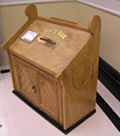Staff and spectators
Main foyer, Parliament House. View as panorama.
Parliament buzzes with activity. Action on the floor of the debating chamber attracts onlookers who enjoy the spectacle of watching the House go about its business. Reporting those events within Parliament, and to the outside world — either in the newspaper, on radio or television — requires a team of people.
Attending to the needs of MPs, running the buildings and grounds, and conducting the official ceremonies demands a small army of staff with specialist skills. Advising on the difficult constitutional aspects of Parliament requires procedural specialists in the Office of the Clerk.
Parliament's Post Office
Parliament had to be able to communicate with people in New Zealand and around the world quickly. From the 1860s it had its own Post Office, as well as a telegraph link. Postal staff and telegraph operators were employed to keep the telegraphs and letters flowing. Parliament also had its own stamp, and any letter posted from Parliament, even today, bears this stamp.
There have been messengers and typists, police officers and cooks, gardeners and nightwatchmen, printers and waiters, shorthand reporters and librarians. There was a time when a job at Parliament was a way to give work to needy and elderly men or war veterans. People remained in these sought-after positions for many years. The Chief Messenger who joined the staff in 1862 stayed for 30 years, and this was not exceptional. Politicians often preferred it this way, for long-serving staff were experienced in the ways of Parliament. For many years women were mainly employed as cleaners.
A parliamentary dynasty
Members of the Bothamley family worked in Parliament for 80 years. It all began in 1871 when Arthur Thomas Bothamley started in the Legislative Council, becoming Clerk-Assistant in 1878. He was Black Rod from 1892 until 1937, the year before he died. His son Grafton Francis worked in the House as a sessional clerk from 1906, and was then employed permanently in 1913; he retired in 1946. His brother, Charles Mildmay, began as a committee clerk in 1917, working his way up the ladder to become the Clerk of Parliaments and of the Legislative Council until its abolition at the end of 1950.
External links
People who work in Parliament (Parliamentary Service website).
Officers of the House (Office of the Clerk website).
Next: The Clerk >

